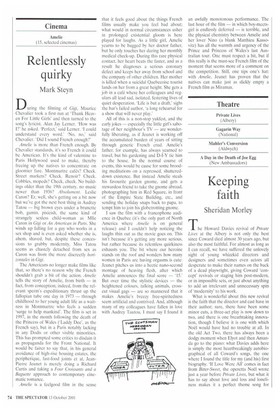Relentlessly quirky
Mark Steyn
During the filming of Gigi, Maurice Chevalier took a first run at 'Thank Heaven For Little Girls' and then turned to the song's lyricist. Alan Jay Lerner. 'How was I?' he asked. 'Perfect,' said Lerner. 'I could understand every word."No, no,' said Chevalier. 'Did I sound French enough?'
Antelie is more than French enough. By Chevalier standards, it's so French it could be American. It's the kind of valentine to Paris Hollywood used to make, thereby freeing up the natives to concentrate on gloomier fare. Montmartre cafés? Check. Street markets? Check. Renoir? Check. Cobbles, mopeds? Check, check. No buildings older than the 19th century, no music newer than 1936? Absolument. Leslie Caron? Er, well, she's getting on a bit now but we've got the next best thing in Audrey Tatou — big brown eyes under a brunette bob, gamin, pixieish, the same kind of strangely sexless child-woman as Mlle Caron in Gigi or An American in Paris. She winds up falling for a guy who works in a sex shop and is even asked whether she is, ahem, shaved, but, despite these concessions to grubby modernity, Miss Tatou seems as chastely detached from sex as Caron was from the more discreetly horizon tales in Gigi.
The Americans no longer make films like that, so there's no reason why the French shouldn't grab a bit of the action. Amelie tells the story of Amelie, from birth — in fact, from conception; indeed, from the relevant sperm's expeditionary thrust up the fallopian tube one day in 1973 — through childhood to her young adult life as a waitress in Montmartre who feels a sudden 'surge to help mankind'. The film is set in 1997, in the month following the death of the Princess of Wales ('Laddy Dee', as the French say), but in a Paris notably lacking in any Dodis or other visible minorities. This has prompted some critics to disdain it as propaganda for the Front National. It would be fairer to say that, in his general avoidance of high-rise housing estates, the peripherique, fast-food joints et al, JeanPierre Jeunet is merely doing a Richard Curtis and taking a Four Croissants and a Baguette approach to contemporary cinematic romance. that it feels good about the things French films usually make you feel bad about; what would in normal circumstances usher in prolonged existential gloom is here played for laughs. As a little girl, Amelie yearns to be hugged by her doctor father, but he only touches her during her monthly medical check-up. During this rare physical contact, her heart beats the faster, and as a result he diagnoses a serious coronary defect and keeps her away from school and the company of other children. Her mother is killed when a suicidal Quebecoise tourist lands on her from a great height. She gets a job in a café where her colleagues and regulars all lead sad, isolated, festering lives of quiet desperation. 'Life is but a draft,' sighs the bar's failed author, 'a long rehearsal for a show that will never play.'
All of this is a non-stop yukfest, and the early jokes — especially the little girl's sabotage of her neighbour's TV — are wonderfully liberating, as if Jeunet is working off the accumulated burden of years of sitting through generic French crud. Amelie's father, for example, has always yearned to travel, but his gardening and D-I-Y tie him to the house. In the normal course of events, this would be cause for some brooding meditations on a repressed, shuttereddown existence. But instead Amelie steals his favourite garden gnome, and gets a stewardess friend to take the gnome abroad, photographing him in Red Square, in front of the Empire State Building, etc., and sending the holiday snaps back to papa, to tempt him to join his globetrotting gnome.
I saw the film with a francophone audience in Quebec (it's the only part of North America where Amelie is on general release) and I couldn't help noticing the laughs thin out as the movie goes on. This isn't because it's getting any more serious, but rather because its relentless quirkiness exhausts you. The bit where our heroine stands on the roof and wonders how many women in Paris are having orgasms is cute: Jeunet pitches us into a hectic nano-second montage of heaving flesh, after which Amelie announces the final score — '15: But over time the stylistic devices — the heightened colours, talking animals, crosscut visual gags — are so mannered that it makes Amelie's breezy free-spiritedness seem artificial and contrived. And, although many of my colleagues have fallen in love with Audrey Tautou. I must say I found it an awfully monotonous performance. The last hour of the film — in which boy-meetsgirl is endlessly deferred — is terrible, and the physical chemistry between Amelie and her lover Nino (a blank Matthieu Kassovitz) has all the warmth and urgency of the Prince and Princess of Wales's last Australian tour. One must respect a hit, but if this really is the must-see French film of the moment that seems more of a comment on the competition. Still, one tips one's hat: with Amelie, Jeunet has proven that the natives can make just as slickly empty a French film as Miramax.


























































































 Previous page
Previous page